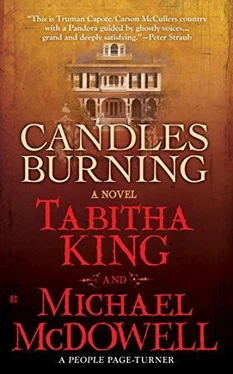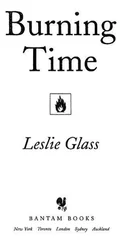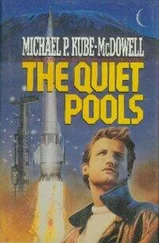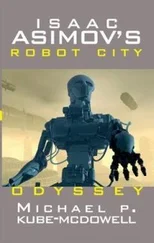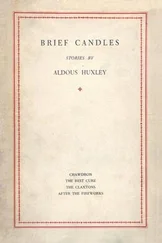The envelope was lovely thick stock, with a Paris, France, postmark on it and no return address on it.
Mama was drinking coffee and doing her nails on the verandah. Once upon a time, she never would have done her nails in public or even semi-public. Miz Verlow frowned in Mama’s direction when she handed me the letter. She said nothing but I could see that she was steamed at Mama about doing her manicure on the verandah.
I took the envelope to Mama, who looked right through me, and waved one hand in the air to dry her nails as she studied the envelope.
“Paris, France,” she said loudly, in case any other guests were in earshot. “Well, I caint imagine.”
Mama wrinkled her nose. She didn’t want to ruin her nails. “Open it for me, Calley.”
I sat on the edge of the railing and slit the envelope open with my oyster knife. A single, folded sheet of the same heavyweight stock filled the envelope tightly. When I shook the folded sheet flat, a photograph dropped free. I caught it with my free hand. It was a black-and-white snapshot of a handsome young man on a sailboat, one hand on the rigging.
Ford. I knew him at once. Grown up, or nearly so, but still Ford.
With the snapshot in one hand, I read the letter aloud:
Dear Mama,
It has taken me a long time even to start to find you. Obviously as a mere child, I could hardly do it. As soon as I could, I began to search for you. Now I know that you are still alive, and where you are, I can hardly wait to see you again. I will shortly return from junior year abroad. It is not my desire to intrude upon your present life. Please come alone to meet me at the Ford automobile agency in Mobile at 3 in the afternoon of the seventeenth of August.
Your loving son, Ford
P.S.
Let me assure you that if you feel any shame at abandoning me, I know now why you did, and understand it, and forgive you.
Tears ran down Mama’s taut face. I handed her the snapshot. She took it with trembling fingers. Wiping her eyes frantically, like a child, with the back of one hand, she stared at the picture of Ford.
“Ford,” she whispered, “my baby.”
Her eyes closed and she kissed the snapshot.
I let the envelope fall to the floor of the verandah. As silently as I could, I slipped away.
The young man in the photograph was of the age that Ford would be now. It was a shiny new snapshot. My first impression that the young man was, in fact, Ford seemed convincing evidence in itself of the authenticity of the photograph.
All that rummaging that I had done to find Ford had been a waste of time.
He had not mentioned me.
Of course, Mama would be more important to him.
I was curious to meet him again, grown up and all, but now there was no particular urgency. Mama would have what she thought was her due, Ford, and access to the fortune that she thought should have been hers. She might very well not marry Tom Beddoes, if Ford took against it.
Understandably, Mama was caught up in the realization of her dreams and desires. So much all at once—not since Daddy died, had so much come her way.
I felt as if a knot had been slipped. Maybe the last knot. What a marvel. Unanswered questions blown away like a dandelion head on a puff of breath.
I had a million dollars, plus one, in a safe place. Not the linen closet. That had been the most temporary of arrangements. Leaving was going to be easier than I had thought.
THE waxing moon hung overhead like a scimitar raised high for the decisive blow. The night was too sultry to sleep inside. Even on the beach, I did not sleep, but sprawled on my blanket staring at the sky. Mrs. Mank’s Benz hummed in the distance along the road to Merrymeeting.
I sat up and hugged my knees and waited. I heard a mouse rolling grains of sand under its paws as it streaked from one sheltered place to another.
Mrs. Mank came over the dune and walked toward me down the beach.
“It’s time to go,” she said.
I nodded. “Before we do, I want to ask a question.”
Irritation sharpened her features.
“Why was Daddy murdered?”
“I have no idea,” she said. “What a peculiar thing to ask me.”
“You should have said because he had the bad luck to fall into the hands of two criminally insane women.”
She took a sharp breath.
“Are you accusing me of complicity?” Her voice rang with incredulity and anger.
I looked past her, at the Gulf waters sprinkled all over with moonlight. I didn’t answer her.
Instead, I asked, “Don’t you want to ask me a question?”
Her expression settled into passivity.
“I may have to wrack my brains,” she said sarcastically. “All right. What’s the latest word from the dead?”
I smiled at her. “Justice.”
She flinched as if I had slapped her.
“And who are you?” she asked. “Judge and jury?”
“No. I’m Calley Dakin, and my daddy was murdered in New Orleans in 1958.”
“That’s the past,” Mrs. Mank said. “His life ended. Yours did not. You have to live the rest of it.”
“Why in hell do you care?” I asked, in a near whisper.
She smiled crookedly. “I don’t care. I want to know what you hear.”
“Why?”
“Don’t act as if you were simpleminded, Calley Dakin. You hear what no one else does. It might have driven you insane. I’ve gone to a great deal of trouble to protect you while you were growing up. I’ll tell you a secret, shall I? But not until we’re in Brookline.”
This time I was not going to refuse, even if I had to go to Brookline, Massachusetts, first.
I rose slowly, gathering my blanket. I folded it with care. Mrs. Mank stood by, watching me.
Merry Verlow stood by the Benz. I walked passed her without a word and went into the house and up the backstairs. Mama’s door was closed, of course. I went into my crookedy-room.
From the shelf over my bed, I took the old bird guide. On the spine it read:
National Audubon Society
Field Guide to
Eastern Land Birds
Just as it had when I took it out of my overalls pocket after listening to it on the beach. I was confident that the flyleaf was inscribed Bobby Carroll. I listened intently but the book was silent. Setting it aside, I stripped off a pillowcase and threw some clothes into it, and my lunar notebook, the old bird guide and Calliope’s locket. I looked out my little window, at the view that I had seen when I first came to Merrymeeting. Every drop of water in the Gulf, every grain of sand on the beach, every molecule of air, was different and yet, it was all the same. Things change, but only into themselves.
Downstairs, outside again, and I went to the passenger side of the Benz and opened the door. Miz Verlow and Mrs. Mank kissed each other on the cheek.
I tried to take in the house all at once. It was shabbier. It creaked more in the wind and the verandah floor was splintery.
Mrs. Mank slipped behind the wheel as I closed the door on the passenger side.
Miz Verlow bent to wave at me, a small wave, and the swiftest quirk of a smile. There was something embarrassed in that smile. Merry Verlow knew that the secret I was going to learn would change everything and would do her no credit. She nodded and stepped back from the car.
“Go to sleep,” said Mrs. Mank, “we’ve a long way to go.”
Sleep? Not hardly.
I settled back in the seat to watch the Gulf as we sped along. Just past midnight, the dark insubstantial as the shadow, it was the time of night that always has felt least like night to me: neither night nor day but a suspension of time altogether. Water and sky surged into one black liquid pulse, the glisten of the moon like the blink of a bird’s golden eye.
Читать дальше
